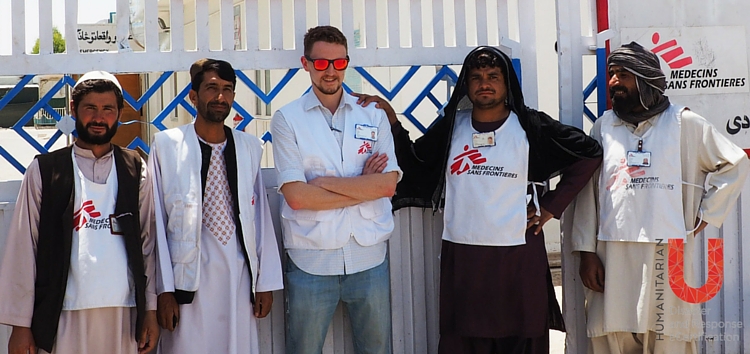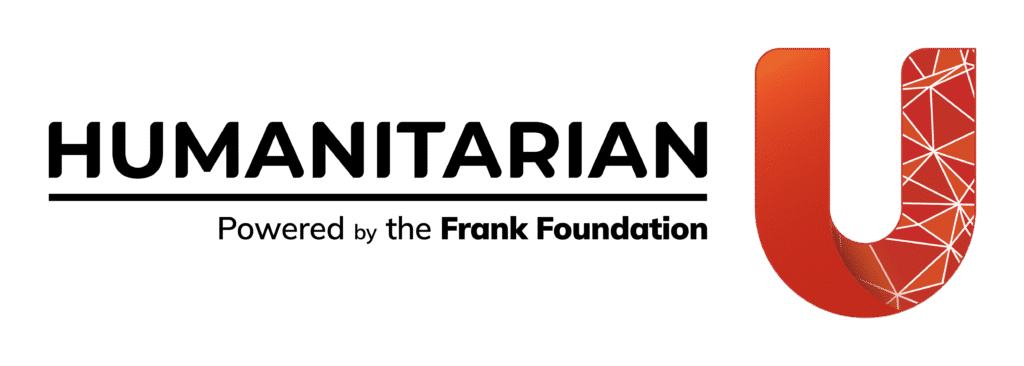He started out as a young traveller, volunteering as a student in Central Africa. Until he realized how much of an impact humanitarian work could have on people’s lives.
That was when Will Plowright decided to take it to next level. “My journey was about trying to get educated in any way that I could”, he says when talking about how he deliberately built his own curriculum.
Today, Will is an expert on security in humanitarian operations, trends in conflict involving armed groups, negotiation of humanitarian space in conflict zones, and the use of child soldiers.
His vast experience includes working in conflict zones such as Afghanistan, Syria, Myanmar and South Sudan. Will has also interviewed members of organizations such as ISIS and the Lord’s Resistance Army, which contributed to a worldview that is anything but black and white.
“You get used to these ideas that [people in] armed groups are monsters. And they are not. They are completely normal people in horribly abnormal situations”, he explains.
Read the first part of this amazing interview. More to come next week!
Humanitarian U – When did you first become interested in humanitarian work? How was the beginning of this journey for you?
Will Plowright – I was very much into travelling when I was in my early 20’s. So, when I found out more about becoming a humanitarian, and the idea that you can actually do work that alleviates some of the suffering you see in the world, I found it quite morally compelling.
From that, I started doing some work in Central Africa with small NGOs, as a student, and eventually that built up into working for more major international organizations.
HU – How were those first experiences?
Will – They were definitely eye opening. I was seeing a new part of the world and learning a great deal about myself.
Nevertheless, I became aware very quickly that in those small trips as a student you are pretty much there for your own growth.
While the idea of working with those small NGOs was great for me, it didn’t actually do very much in providing help for the local community. That realization inspired me to become properly trained so that I could work for professional humanitarian organizations.
HU – How did you get the training?
Will – My role is a bit of an odd one. I basically do conflict analysis. And that’s not a vocation like Nursing, for which you can get a formal training and then become a nurse. My journey was about trying to get educated in any way that I could.
In addition to formal university education, I would take part in any training that I thought was relevant to what I wanted to do.
So, child protection training, training on how to deal with child abuse or how to engage with people who suffered trauma, all these sorts of things. I was just finding training wherever I could.
HU – So, could we say that you pretty much built your own curriculum?
Will – Yes, that’s probably a fair way to put it, to a certain extent. For lots of people who go into the area that I’m in – policy, strategy and conflict analysis – you kind of have to do that.
It’s not like when people go to medical school, become doctors, and then work in humanitarian relief. There aren’t clear “1-2-3 steps” to getting prepared. You have to be somewhat creative about how to get experience, and how to get trained, so that you actually know what you’re talking about, hopefully!
HU – What has been your most recent field experience?
Will – I was in Afghanistan for nine months, working for MSF [Doctors Without Borders] – I just got back two months ago. I was in one of the hospitals they run, in the south of the country, overseeing the training of the Afghan staff, both medical and non-medical.
HU – What was a normal day for you like, in this position?
Will – It would normally start early in the morning. We’d leave the compound at about 7:00 am. We travelled in a convoy to the hospital. Once there, my day would consist of lots of time in conversation with people from all different parts of the hospital, trying to work out their needs in terms of training, figuring out where should we focus our training energy.
Part of the day would also be spent in some kind of training. Maybe supporting some of medical training with the doctors, helping the nurses improve on wound dressing skills, or educating the guards on issues of security.
We usually end the workday around 6 pm, and go back to the compound for dinner. I would have most evenings off.
HU – What has been your most memorable experience in a conflict zone?
Will – It’s hard to pick one. I guess my first experience in Uganda when I was interviewing some guys from the LRA [Lord’s Resistance Army] stands out. You get used to these ideas that [people in] armed groups are monsters, terrorists, psychopaths, evil and all that. And they are not. They’re completely normal people in horribly abnormal situations.
And so, sitting down and talking to them was one of the most eye-opening experiences of my life. I realized that, even though these were essentially war criminals, they were basically nice people. Even though I knew they could be going to trial because of their crimes, they were being nice to me. It was a kind of an internal conflict.
HU – How do humanitarians deal with being impartial when working in conflict zones?
Will – When you are working for a humanitarian organization, the idea of impartiality is pretty easy to embody. The idea is that everyone deserves to receive assistance based solely on their needs, not based on who they are or what their beliefs are. At the same time, there can be situations where organizations accidentally support armed groups because they were not careful enough about how they distributed resources and care.
Alternatively, if you work in a country where there is a conflict between the government and an armed group, the government might restrict your access and accuse you of supporting an armed group.
For the most part, though, the way it works is you kind of “set up shop” and help the people that need it the most – and they are usually pretty easy to identify. Not always, but usually.
HU – Do armed groups generally respect humanitarian space?
Will – It depends very much on the place, but basically any professional humanitarian organization that goes into a conflict zone should have a direct line of communication with all belligerents – be they government, armed group, ethnic militia, or any other. These are usually not going to be formal agreements, but verbal understandings. This “negotiated access”, as it is called, is essential. If you don’t have it, then you probably shouldn’t be there.
If you are working in the neighbourhood of an armed group, you have to make sure they want you there, or that they will allow you to be there. Otherwise, you are putting yourself and your staff at unaccountable risk, as well as the people you are there to help. They can become targets as well.
You always have to strive for balance between not wanting to support armed conflict in any way, but at the same time having to deal with the local power actors or holders. You need to have what they call “acceptance” – the local community has to accept you and want you to be there. Or else, you shouldn’t be there at all.
HU – Are there any current standards for humanitarian organizations that need to negotiate access in conflict areas?
Will – It is incredibly context-dependent. There are no set standards beyond just engaging with all local actors, and making sure you have an ongoing dialogue with them. Also, making sure you have acceptance. But beyond that, how do you actually accomplish this depends entirely on where you are working.
HU – What are some strategies for humanitarian organizations negotiating access in conflict zones?
Next week, see the answer to this and other questions we asked Will Plowright.

